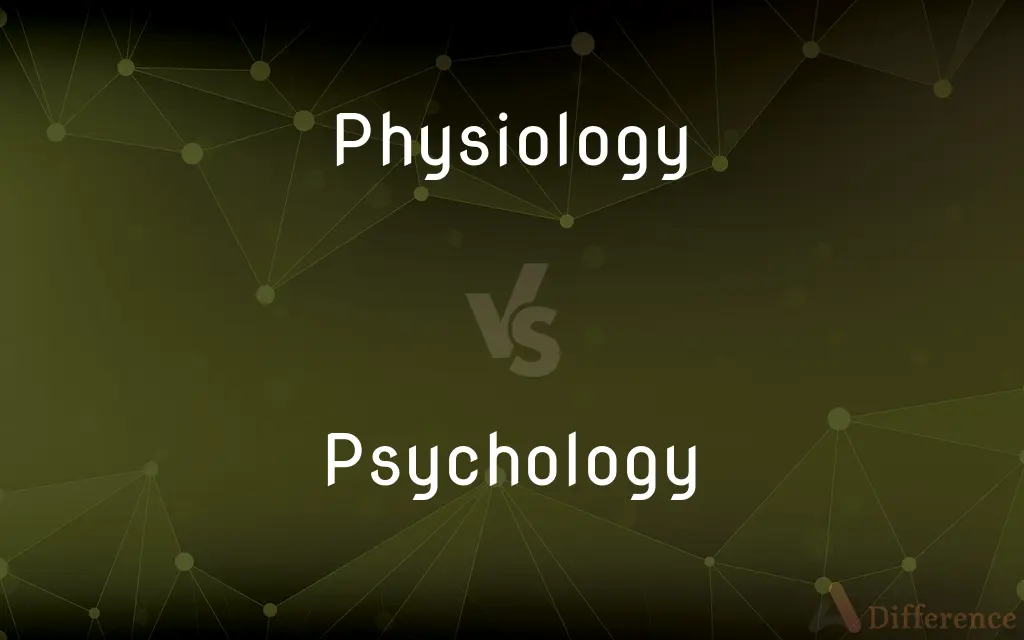Physiology vs. Psychology — What's the Difference?
By Maham Liaqat & Urooj Arif — Updated on March 12, 2024
Physiology studies the mechanical, physical, and biochemical functions of living organisms, while psychology focuses on the mind and behavior.

Difference Between Physiology and Psychology
Table of Contents
ADVERTISEMENT
Key Differences
Physiology explores how the body's systems work and interact, examining processes from cellular functions to the operations of major organs. It delves into the mechanisms behind human health, disease, and physical responses to the environment. On the other hand, psychology investigates the mental processes, emotions, and behaviors of individuals. It seeks to understand how people perceive, think, feel, and act both as individuals and within groups.
While physiology often involves experimental and observational methods to study the functions of the body at various levels, psychology utilizes a range of techniques, including experimentation, observation, and psychoanalysis, to explore the complexities of the human mind and behavior. This difference in approach highlights the distinct natures of the two fields, with physiology rooted in the sciences of biology and chemistry, and psychology bridging the social sciences and natural sciences.
Physiology is crucial for the medical field, contributing to the development of treatments, medications, and understanding of how human bodies operate. Psychology, whereas, offers insights into mental health, providing therapies and strategies to cope with emotional and psychological challenges.
In physiology, the focus is often on the universal aspects of biological function, seeking general principles applicable to all living beings. Psychology, while also seeking broad understandings, places a strong emphasis on the diversity of human experience and the individual differences in behavior and mental processes.
Understanding physiology is essential for advancing medical science and health care, aiming to improve the physical well-being of individuals. Psychology, on the other hand, is pivotal in enhancing mental health services, educational programs, and understanding societal dynamics, emphasizing the importance of mental and emotional well-being.
ADVERTISEMENT
Comparison Chart
Focus
Biological functions and processes of living organisms
Human mind, behavior, and emotional processes
Methods
Experimental, observational, biochemical analyses
Experimentation, observation, psychoanalysis
Relevance to
Medicine, health care, biology
Mental health, education, social sciences
Emphasis
Universal biological principles
Diversity of human experience, individual differences
Primary Concern
Physical well-being and bodily functions
Mental and emotional well-being
Compare with Definitions
Physiology
The study of how living organisms function.
Physiology covers topics from the role of neurons to the functions of the heart.
Psychology
The study of how individuals think, feel, and behave.
Clinical psychology focuses on diagnosing and treating mental illness.
Physiology
The examination of systems within living beings.
Renal physiology explores how kidneys filter blood.
Psychology
An academic discipline exploring human interaction and development.
Developmental psychology examines how people change over their lifespans.
Physiology
A branch of biology focusing on the normal functions of organisms.
Physiology classes often include lab experiments to observe muscle responses.
Psychology
The science of behavior and mental processes.
Psychology encompasses studying cognitive behaviors and emotional responses.
Physiology
The analysis of biological mechanisms in health and disease.
Cardiovascular physiology looks at how heart diseases affect body functions.
Psychology
The application of knowledge to improve mental health, education, and workplace environments.
Industrial-organizational psychology optimizes workplace productivity and employee satisfaction.
Physiology
The scientific investigation of life processes.
Plant physiology studies how photosynthesis occurs in leaves.
Psychology
The examination of the mind and its influence on behavior.
Cognitive psychology investigates memory, perception, and problem-solving.
Physiology
Physiology (; from Ancient Greek φύσις (physis) 'nature, origin', and -λογία (-logia) 'study of') is the scientific study of functions and mechanisms in a living system. As a sub-discipline of biology, physiology focuses on how organisms, organ systems, individual organs, cells, and biomolecules carry out the chemical and physical functions in a living system.
Psychology
Psychology is the science of mind and behavior. Psychology includes the study of conscious and unconscious phenomena, as well as feelings and thought.
Physiology
The biological study of the functions of living organisms and their parts.
Psychology
The science that deals with mental processes and behavior.
Physiology
All the functions of a living organism or any of its parts.
Psychology
The emotional and behavioral characteristics of an individual, a group, or those engaged in a given activity
The psychology of war.
Physiology
A branch of biology that deals with the functions and activities of life or of living matter (as organs, tissues, or cells) and of the physical and chemical phenomena involved.
Psychology
Subtle tactical action or argument used to manipulate or influence another
He used poor psychology on his employer when trying to make the point.
Physiology
(obsolete) The study and description of natural objects; natural science.
Psychology
(Philosophy) The branch of metaphysics that studies the soul, the mind, and the relationship of life and mind to the functions of the body.
Physiology
The science which treats of the phenomena of living organisms; the study of the processes incidental to, and characteristic of, life.
Psychology
(uncountable) The study of the human mind.
Physiology
A treatise on physiology.
Psychology
(uncountable) The study of human or animal behavior.
Physiology
The branch of the biological sciences dealing with the functioning of organisms
Psychology
The study of the soul.
Physiology
Processes and functions of an organism
Psychology
(countable) The mental, emotional, and behavioral characteristics pertaining to a specified person, group, or activity.
Psychology
The science of the human soul; specifically, the systematic or scientific knowledge of the powers and functions of the human soul, so far as they are known by consciousness; a treatise on the human soul.
Psychology, the science conversant about the phenomena of the mind, or conscious subject, or self.
Psychology
The science of mental life
Common Curiosities
Can physiology and psychology overlap?
Yes, in areas like neuropsychology, where the focus is on how the brain's structure and function affect psychological processes.
What is the main difference between physiology and psychology?
Physiology studies the biological functions of living beings, while psychology focuses on the mind and behavior.
How do methods in physiology and psychology differ?
Physiology uses more experimental and biochemical methods, while psychology employs observations, experiments, and qualitative analyses.
Can a physiologist work in mental health fields?
Yes, especially in research roles that explore the physiological bases of mental health issues.
What role does psychology play in education?
It helps in understanding learning processes, educational challenges, and developing teaching strategies.
Why is physiology important in medicine?
It helps in understanding how the human body works, aiding in the diagnosis, treatment, and prevention of diseases.
Is psychology considered a science?
Yes, it's a science that employs rigorous methodologies to study mental processes and behavior.
What educational path is required for a career in physiology?
Typically, a background in biology, chemistry, and advanced degrees in physiology or related fields.
How does psychology contribute to mental health?
It provides the basis for therapies and interventions that improve mental well-being and treat mental illnesses.
How do physiological studies impact healthcare?
They inform the development of medical treatments, drugs, and healthcare strategies.
Are psychologists concerned with physical aspects of behavior?
While primarily focused on mental processes, psychologists also consider how physical conditions and the brain influence behavior.
What educational background is necessary for psychology?
A degree in psychology is required, often followed by postgraduate qualifications for specialized fields.
Share Your Discovery

Previous Comparison
Enable vs. Able
Next Comparison
Product vs. ByproductAuthor Spotlight
Written by
Maham LiaqatCo-written by
Urooj ArifUrooj is a skilled content writer at Ask Difference, known for her exceptional ability to simplify complex topics into engaging and informative content. With a passion for research and a flair for clear, concise writing, she consistently delivers articles that resonate with our diverse audience.
















































